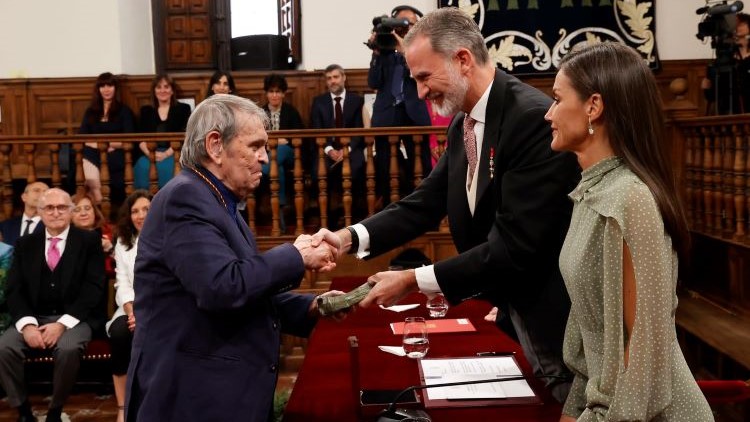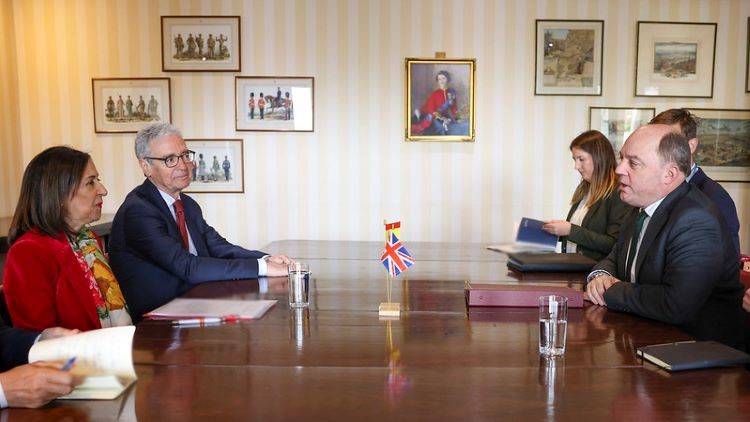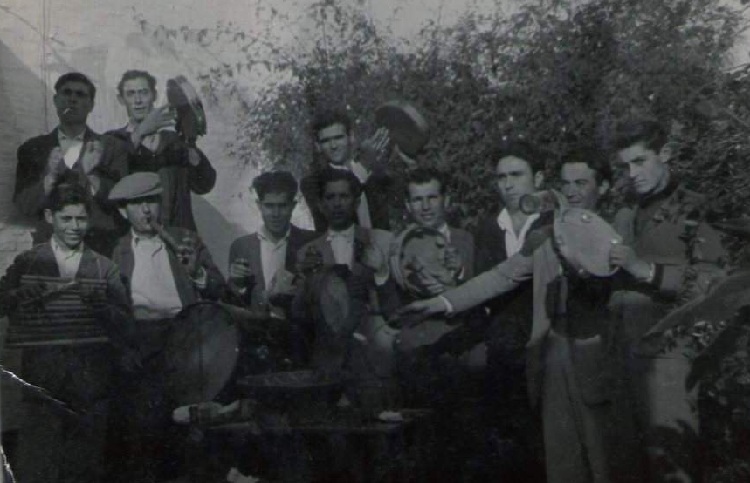The Diplomat
Don Felipe and Doña Letizia yesterday presented the Miguel de Cervantes Prize for Literature in the Spanish Language to the poet Rafael Cadenas, making him the first Venezuelan to receive the most important recognition in Spanish and Latin American literature. The President of the Government, Pedro Sánchez, did not attend the event.
“It is a pleasure, and an honor, to have presented Rafael Cadenas with the highest award in Spanish-language literature, who now belongs with full honors to the lineage of Don Miguel de Cervantes y Saavedra,” said the King during his speech at the ceremony.
“In a short time, the Cervantes Prize will be half a century old,” he recalled. “Reviewing the names of those who have won it is in itself the contemporary history of Ibero-American literature,” he continued. “Almost all Spanish-speaking countries and certainly all genres have been represented” and, in this 2022 edition, the jury has distinguished “a great Venezuelan poet, thus adding his country to the history of our beloved Cervantes Prize and expanding with it the geographical scope of the winners,” he added.
“This is the first Venezuelan author to receive the award, which widens the geographical scope of the winners of this prize,” said the Ministry of Culture and Sport, the institution in charge of awarding the Cervantes Prize, which is endowed with 125,000 euros.
The King was accompanied at the event by the Minister of Culture and Sport, Miquel Iceta; the President of the Community of Madrid, Isabel Díaz Ayuso; and the Mayor of Alcalá de Henares, Javier Rodríguez, among other authorities. Who did not attend the event was the President of the Government, Pedro Sánchez, whose absence was harshly criticized by Isabel Díaz Ayuso, who recalled that Cadenas is “recognized for his work and for being a brave man who has fought for freedom in Venezuela against the Chavista dictatorship”. “Unfortunately, the President of the Government will dishonor with his absence the greatest award of Spanish literature,” she said at a business event. In his opinion, the President of the Government did not want to attend so as not to have to “congratulate a poet who defends the freedom that his Bolivarian friends destroy”.
For her part, the Government spokeswoman minister, Isabel Rodríguez, declared that Sánchez did not attend the event because of his “very intense agenda”. “At the moment he has other issues on the table,” she told Antena 3, referring to his appearance today in the Senate, preparations for the Spanish Presidency of the EU and the trip to the United States to meet with President Joe Biden. According to Rodríguez, “it is not the first time it has happened”. In this regard, he recalled that Sánchez has only attended this event on one occasion (in 2019 he was represented by the then first vice president, Carmen Calvo) and that his predecessor, Mariano Rajoy, was also absent at the 2015 and 2017 ceremonies.
Despite being the first Venezuelan to receive the Prize, the government of Nicolás Maduro refused to congratulate him last November when the award was announced. “I have not received congratulations, nor do I expect it. I have a disagreement with the regime, but I am not participating in politics either”, the poet declared to the newspaper El Nacional. Rafael Cadenas belonged in his youth to the communist party (during the dictatorship of Marcos Pérez Jiménez, which forced him to go into exile between 1952 and 1956), but he distanced himself from it and its ideology over the years.
Today, Don Felipe and Doña Letizia will host the traditional lunch at the Royal Palace in Madrid, which will bring together authorities, academics, publishers, critics, professors, booksellers and writers to pay tribute to the award-winner. The program of cultural activities of the Cervantes Week 2023 will also start today at the Instituto Cervantes headquarters, with the inauguration of the bibliographic exhibition Del uno al otro confín (From one to the other end) by the director, Luis García Montero, and with the tribute, precisely, to Rafael Cadenas, who will deposit his legacy to the Caja de Las Letras.
The Cervantes Prize was awarded for the first time in 1976 to Jorge Guillén and, since then, 48 authors have been awarded. In 1979, the Prize was awarded ex aequo to Jorge Luis Borges and Gerardo Diego. Since then, the order of convocation stipulates that the Prize cannot be divided, declared void or awarded posthumously. The awarding of this prize is an annual public testimony of admiration for the figure of a writer who, with his or her work as a whole, has contributed to enriching the Hispanic literary legacy. The Cervantes Prize may be awarded to any author whose literary work is written entirely, or in essential part, in Spanish. Candidates for the Prize may be presented by the Academies of the Spanish Language, by authors who have received awards in previous editions, by institutions which, by their nature, purpose or content, are linked to literature in the Spanish language, and by the members of the Jury.







